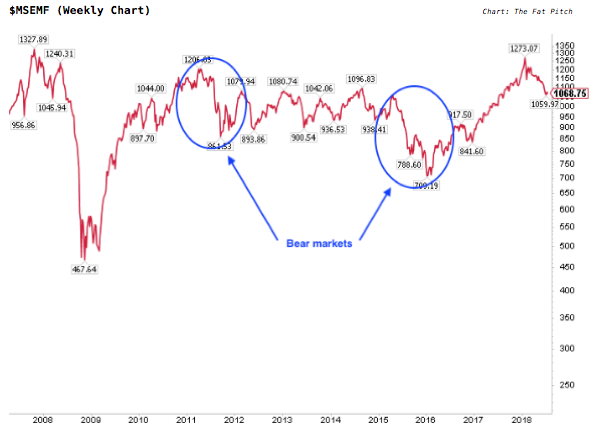Throughout 2016 and 2017, the emerging markets staged an impressive rally. The MSCI Emerging Markets Index surged more than 60%. But since hitting a peak in late January, the index has fallen roughly 15% and currently sits down 8% year-to-date. The slide is attributable to the rebound in the dollar, which always creates an immediate headwind for emerging market stocks and bonds. Additionally, an increase in global trade tensions and an upward move in interest rates have brought further pressure.
We believe that these headwinds are near-term issues obscuring a much more powerful dynamic in place for EM countries: robust GDP growth. According to the International Monetary Fund (IMF), the global economy is poised to grow 3.9%. Emerging markets are expected to expand by a more robust 4.9% in 2018, and that figure surges to 6.5% for markets in Asia.
In general, emerging market economies are at a much earlier stage of the growth cycle than developed markets and as their economies, governments and infrastructure advance so to will their productivity. As productivity and incomes have risen, consumers in these countries have become a greater force in their local economies. The Brookings Institute estimates that the middle class in India will grow more than 5x it’s current size by 2030 (from 12% to 75% of the population) and will double over the same time in China from 30% to 72%. Earnings for firms in the Dow Jones Emerging Markets Consumer Titans 30 Index, for example, are poised to rise 43% in 2018 (and another 20% in 2019).
Despite the lagging year-to-date returns in emerging markets and their inherent volatility – we remain positive on the asset class. We believe that as US debt levels grow the dollar will weaken and that the trade war fears will fade away as concessions are made. Further, if we look back over the last decade, emerging market stocks have still yet to reclaim their pre-financial crisis 2007 highs as the index has seen two 30% declines since 2011 and we are again sniffing bear-market territory here in 2018. This runs in marked contrast to all other major equity asset classes and there should be some opportunity for EM stocks to outperform over the next 12-24 months.

When investing in emerging markets we generally prefer active fund managers to help navigate the many different political, economic and currency risks that are involved with international investing. We will continue to look for opportunities to add to our emerging markets exposure as we conduct our due diligence for manager selection.
Disclosure: Nothing on this site should ever be considered to be advice, research or an invitation to buy or sell any securities. Full disclaimer.